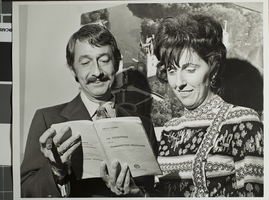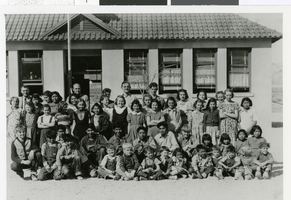Search the Special Collections and Archives Portal
Search Results

Photograph of Adalberto Meneses and woman, University of Nevada, Las Vegas, circa 1970s
Date
Archival Collection
Description
Adalberto Meneses, teacher, and a woman at the University of Nevada, Las Vegas.
Image

Photograph of a school group photo, Beatty (Nev.), 1937-1938
Date
Archival Collection
Description
Image
Series I. Writings, 1937-1953
Level of Description
Scope and Contents
The Writing Series contains all of Hazel Denton's written work, both published and manuscript (drafts for a book and college papers for example), and demonstrates her growth as a writer and the relative position of professional women in society during the time she was writing.
Denton's columns appeared in several Lincoln County newspapers from approximately 1937 to 1953. Most of this work is in the society columns "Caliente All the Time" and "While the Toast Burns." She also wrote "The Tidewater Sketches," a column that tells of her summer in Washington, D.C. attending Wilson Teachers College. Denton's book Ironing Day is included in this series along with correspondence from the publisher and handwritten drafts of the book.
Archival Collection
Collection Name: Hazel Baker Denton Papers
Box/Folder: N/A
Archival Component
Franca Dell'Olio oral history interview
Identifier
Abstract
Oral history interview with Franca Dell’Olio conducted by Gary Mayers on February 12, 2006 for the Public School Principalship Oral History Project. In this interview, Dell’Olio reflects upon her 15-year career in education as a high school teacher and administrator in California from the 1990s to the 2000s. She describes the process by which she chose to become a teacher and eventually an administrator, and describes her regular job responsibilities. She also discusses effective leadership qualities, and offers suggestions for individuals interested in pursuing school administration.
Archival Collection
Everett E. Daniels oral history interview
Identifier
Abstract
Oral history interview with Everett E. Daniels conducted by Gary Trbovich, Jr. on November 10, 2008 for the Public School Principalship Oral History Project. In this interview, Daniels reflects upon his experiences as a teacher and administrator with Ohio’s Canton City School District (CCSD). He discusses the influence of sports on his education and career, and how coaching influenced his approach to school administration and his working relationships with teachers, students, and other administrators. He also describes his typical responsibilities and challenges at different schools, and his experience with central office administration.
Archival Collection
Roberta Holton oral history interview
Identifier
Abstract
Oral history interview with Dr. Roberta Holton conducted by Wendy Park on November 20, 2006 for the Public School Principalship Oral History Project. In this interview, Holton reflects upon her 28-year career as a teacher and administrator with the Clark County School District. She discusses challenges that she faced in obtaining a teaching position, and some of her biggest challenges that she faced after being hired as a teacher and eventually principal. She also describes challenges that she faced in opening schools within the school district, and offers suggestions on how to be an effective principal and school administrator.
Archival Collection
Educational Equity Resource Center Records
Identifier
Abstract
The Educational Equity Resource Center (EERC) records contain material from workshops hosted by the EERC throughout Southern Nevada, especially Las Vegas, Nevada, between 1973 and 2000. The EERC aimed to provide teachers, students, and parents information on gender equity education, support, and training. Workshop materials include participant worksheets, surveys, brochures, instructional booklets, advertisements, correspondence, and evaluation forms. Workshop participants include K-12 students, postsecondary school students, educators, and parents. The records also include EERC organizational correspondence, reports, newsletters, publications, and resources detailing workshop and EERC funding, development, and promotion.
Archival Collection
Gretchen Braner oral history interview
Identifier
Abstract
Oral history interview with Gretchen Braner conducted by Stacey Skidmore on November 24, 2009 for the Public School Principalship Oral History Project. In this interview, Braner reflects back on her career as a teacher and administrator with the Clark County School District from the 1980s to the early 2000s. Braner discusses the process by which she trained to become a school administrator, which portions of the training were most beneficial, and the importance of life experiences in shaping her philosophy of education. She describes her regular job responsibilities, and explains the importance of balancing work priorities to avoid burnout. She also discusses the importance of fostering relationships with students and staff to make school administration meaningful.
Archival Collection

Transcript of interview with Charles T. "Blackie" Hunt by Cork Proctor, July 3, 2003
Date
Archival Collection
Description
Charles T. "Blackie" Hunt, born in Pottstown, Pennsylvania in 1930, started accordion lessons at age five. He recounts learning from experienced musicians, then teaching others at age twelve because his teacher was drafted. He attended West Chester State Teachers College where, among other accomplishments, he put together a group with Nick Carlino as tenor sax player. Blackie shares detailed memories of the many musicians with whom he worked and toured. They played in venues that included Harrisburg, Toronto, and Montreal, and eventually were offered a booking at the Sahara Hotel in Las Vegas. The group that Blackie worked with in Las Vegas, Tahoe, and Reno came up with the name "The Characters" (backward 'e'), and the show featured comedy and music. It was during this time that he met Lorraine (stage name Lauri Perry), who had her own group. They were married after a couple of years and Lauri joined The Characters. Blackie and Lorraine Hunt opened Blackie's Bar on Tropicana and Eastern Avenues in the seventies. He talks about the jazz sessions that took place and the musicians who sat in on them, and how he and Lorraine eventually decided to bow out of show business themselves. The Hunts went on to open the Bootlegger, a restaurant/piano bar on Las Vegas Boulevard. They started a little comedy/music session called "Off the Cuff', in which local or touring musicians, comedians, and singers often participate. Blackie and Lorraine have been part of the vibrant history of Las Vegas and the state of Nevada for many years, and continue to make their home here.
Text

